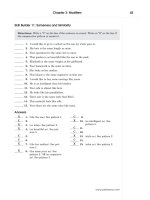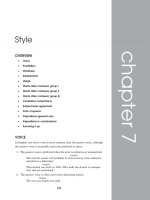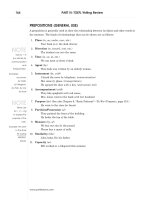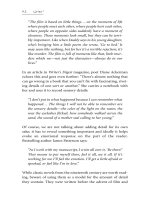Your writing coach part 26 pot
Bạn đang xem bản rút gọn của tài liệu. Xem và tải ngay bản đầy đủ của tài liệu tại đây (78.64 KB, 7 trang )
“You must be clear about the goals you set, flexible about the
process of achieving them, and then continually learn all you
can in every way possible.”
The best way to stay on track is to review your goals monthly. If
what you’re doing to move toward that goal isn’t working, decide
what you can do differently, and identify what would be helpful
for you to learn in the coming month.
Stay flexible
Although I believe strongly in setting goals, it’s also important to
keep your eyes open for unexpected opportunities. Sometimes
people get so fixated on a specific goal that they don’t even notice
that something else, which might give them just as much, if not
more, money and satisfaction, is available for the taking.
Traditional approaches to setting and reaching goals say you
should focus so much on your goal that you filter out all other
possibilities, but in a chaotic and unpredictable climate this may
be e
xactly the wrong strategy. One way to maintain flexibility is
to make sure that when you review your progress toward the
goal, you also ask yourself whether it is still important to you.
Otherwise you may find, as one executive said, “I spent years
climbing the ladder and finally got to the top only to find it was
leaning against the wrong wall.” Also, when a new opportunity
comes up that clashes with your goal, carefully examine whether
it might be worth pursuing even if it means delaying or discard-
ing your current goal.
Expect obstacles
Some writers assume that once they have had their first break-
through, for example having a novel published, their troubles are
at an end. I have a favorite Zen story about people and problems:
242 Sell!
A farmer went to see the Buddha about his various prob-
lems: The weather was either too hot and it dried out his
crops, or too wet and it caused floods, and his wife didn’t
understand him, and his son was ungrateful and rebel-
lious. The Buddha said he couldn’t help because all
human beings have 83 problems. A few may go away, but
soon enough others take their place. So we will always
have 83 problems.
The farmer was indignant. “Then what is the good
of all your teaching?” he demanded.
The Buddha said, “My teaching can’t help with the
83 problems, but perhaps it can help with the 84th.”
“What’s that?” the farmer asked.
“The 84th problem,” the Buddha said, “is that we
don’t want to have any problems.”
The reality is that every writing career, just like every other
career, has ups and downs. You can have a great success and then
something happens that throws you off. Maybe an editor or pro-
ducer who loves your work gets fired, retires, or dies, or the pro-
duc
tion company that wanted to make your movie goes
bankrupt, or a magazine folds without paying you for work
you’ve already done (I’ve experienced all of these). Of course,
you must take sensible precautions, but some things will always
be out of your control, and if you accept that you will find the
setbacks easier to take.
Be your own role model
When you do encounter an obstacle that leaves you at a loss
about how to proceed, consider being your own role model. One
of the hot areas in management and self-development is “mod-
eling”; that is, observing how experts do what they do, and then
doing the same things. However, it’s even easier to model your-
self. Here’s how.
The Writing Life 243
Make two columns on a piece of paper. In one column, write
down all the things you do really well (not just in your work, but
in any area of your life). In the second column, list the problem
or obstacle you’re facing. Now look at how you approach the
things you do well and consider how that might translate to deal-
ing with the situations in the second column. For example, if you
are really good at keeping your office tidy but not at writing
query letters, what can you apply from the first experience to the
second? Combine different pairs until you find a model that
might work, then try it out.
Sometimes winners do quit
Have you heard the saying, “Winners never quit, and quitters
never win?” In general, perseverance and determination are great
qualities for a writer. However, sometimes knowing when to quit
is also a powerful asset.
I had a painful reminder of this not so long ago. I wrote a tel-
evision series for Germany that the director, with the backing of
the producer, changed a lot, for the worse. In my heart I knew I
should quit the project and take my name off it, but I rational-
ized my way out of that decision. The outcome: The series
flopped with my name still on it. The moral: Trust your vision
and be true to yourself. When it’s no longer possible to do that
within a particular situation, get out.
Here’s what director Tim Burton had to say about this in a
recent interview:
“There was a very specific moment in my life when I had a
breakthrough. I was at the California Institute of Arts, and I
had been getting more and more exasperated because I was
trying to fit into a certain style of drawing—the Disney
way—and I almost had a breakdown, and I was just sitting
there and I said, ‘You know what? I can’t draw like this. I’m
just gonna draw whatever way I draw and that’s it.’ And at
244 Sell!
that moment, my drawings changed. In one second, I drew
completely different. In a different style and a different way.
It was like a drug experience—literally, my mind expanded.”
Turn troubles into assets
An article in The Times (London) told how a writer named Clare
Allan used her writing to deal with her mental illness. She said,
“Writing helped me recover. You need a purpose in life and for
me that was crucial.” Writing also changed her attitude toward
the distressing times she had: “You can be having the worst expe-
rience in your life and a bit of you is thinking, ‘Ooh, that’ll be a
good story.’”
Allen’s first book,
Poppy Shakespeare, is based partly on her
experiences, but writing that never gets published can still be a
great outlet. There’s something about putting down your experi-
ences, whether as a journal or transformed into fiction, that
allows you to take a healthy step back from them.
Stay true to yourself
In other chapters I’ve already warned against trying to write to
suit current fads rather than your own vision. Naturally, you
have to pay attention to the marketplace, but the real break-
throughs often are the projects that offer something new and dif-
ferent. Here’s a surprising story of what happened when one
person decided to go her own way.
Young artist Erin Crowe found the face of former Federal
Reserve Board Chairman Alan Greenspan interesting, and for
two years she painted a variety of portraits of him, based on pho-
tos. When she needed to raise some money before going off to
graduate school, she decided to try selling some of them. Family
friends owned a gallery in New York, and agreed to host a show
of her Greenspan paintings. According to
The Artist’s Magazine:
The Writing Life 245
“no one was prepared for what happened next. CNBC did a
piece on Crowe’s gallery show, and it went from moderately
successful to sold-out in a few short hours. Bankers, hedge
fund managers and other Wall Street types lined up to buy
her oil paintings of the famous financial figure.”
If you truly believe in what you are doing, sometimes it pays to
go with your impulse, even it’s totally new or just plain weird.
Be bold
A related point to being true to your vision is being bold.
Recently I attended a life drawing class, where one of the main
points made by the instructor is that we should draw big. Even
with a large piece of paper in front of us, many of us started to
draw a little figure, maybe because we’re used to writing or draw-
ing on smaller sheets of paper. At first daunting, using the entire
page is quite exhilarating after a while.
There’s something in that for us as writers, too: Do we habit-
ually “write small”? How often do we step back and see the larger
canvas and decide to go for making the bigger, bolder mark? This
could mean taking on a bigger theme than you normally dare to,
or writing more colorfully, or creating a character that fully
reflects your shadow side.
Remember what’s really important
As much as I hope that you will make a lot of money from your
writing, it’s possible that you will encounter some lean years.
There may be times when you wonder whether you should go
back to the day job that you didn’t enjoy but that brought in
more money. Here’s a thought-provoking passage written by
someone who goes by the name of Psy, in an issue of
Reclaiming
Quarterly
magazine:
246 Sell!
“Imagine that a rich relative left you an inheritance. There is
enough money that you never have to work again if you keep
your expenses low by sharing an apartment with roommates,
using the bus instead of owning a car, cooking your meals at
home, and so on. What would you do with your time? Would
you work at all? Learn to play the piano? Be a full-time
parent? Where do your passions lie? Why aren’t you follow-
ing those passions right now? Why aren’t you living that life?
Is your path in life more important than living a lifestyle that
obscures it? Can you make some changes to your lifestyle to
rebuild your life around your passions? Will you?”
If writing is really important to you, it could be worth making
some sacrifices in order to allow yourself to keep going with it.
As well as deciding how to spend money, it’s vital to be aware
how you’re spending your time. I’ve already addressed this in
another chapter, but it’s so important that I want to reiterate it,
because it’s easy to lose sight of it when we encounter other time
pressures.
Here’s what top executive Nandan Kilekani (CEO of Infosys)
told
For
tune
magazine ab
out his attitude to time: “I have a say-
ing—I am generous with my money and stingy with my time. I
think time is the most important asset I have.”
All too often, we count our pennies but waste our minutes (or
hours). If you begin to fall behind in your writing, ask yourself
what you could stop doing, or pay someone else to do, in order
to have more time to write.
This isn’t goodbye
We’ve come to the end of this book, but not the end of our con-
nection. I’ve set out to be your writing coach, and I hope as time
goes on you will refer to this book again, to help you through any
rough spots or inspire you when you start a new project. If you
haven’t done so, be sure to make use of all the chapter bonuses on
The Writing Life 247
the website www.yourwritingcoach.com. There you will also be
able to contact me via email. If you have a problem I can help
with, let me know, and please also tell me about your writing suc-
cesses. I look forward to hearing from you.
KEY POINTS
✐ Setting and pursuing goals must be balanced with the
flexibility required to take advantage of unexpected
opportunities.
✐ Obstacles are a normal part of the writing life, but one way
we can overcome them is to use our past successes in any
aspects of our lives as a model.
✐ Sometimes quitting is a good idea.
✐ Be bold.
EXERCISES
✐ Goals t
end to evaporate unless they are written down, have
a target date, and are measurable. Make a chart showing
your three top goals, when you expect to reach them, and
how you’ll measure your progress toward them.
✐ When you read a newspaper or magazine, put on the filter
of “What opportunity will I find in this material today?”
Keep a log of your ideas and act on the best ones.
CHAPTER BONUS
On the website www.yourwritingcoach.com, click on the
“Chapter Bonuses” tab, then the “Life” tab, and type in the code:
life. You will be taken to a video interview with… me. I’ll be talk-
ing about crafting your long-term career as a writer.
248 Sell!









